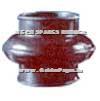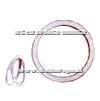
Rotary And General Sealing
Type A Single Lip – Rubber Coated w/ Spring (Rotary Seals or Oil Seals)
[Type A Single Lip]
DIN: 3760 Standard.
Common Materials: Nitrile, Fluorocarbon, Silicone, EPDM, Polyacrylate, Neoprene.
Spring make: Carbon Steel Stainless Available.
Pressure Rating: Max 7psi.
Mounting: Press-fit.
Comments: Common grease seal type. Rotary Motion Only. Generally used for sealing lower pressure (up to 0.5 bar/7psi) fluids or heavy greases depending on shaft speed. If a backup ring is used, it can operate at medium pressure (4 bar/57psi).
Type ADL Double Lip – Rubber Coated w/ Spring (Rotary Seals or Oil Seals)
[Type ADL Double Lip]
DIN: 3760 Standard.
Common Materials: Nitrile, Fluorocarbon, Silicone, EPDM, Polyacrylate, Neoprene.
Spring make: Carbon Steel – Stainless Available.
Pressure Rating: Max 7psi.
Mounting: Press-fit.
Comments: Common grease seal type. Rotary Motion Only. Generally used for sealing lower pressure conditions with medium dirt exclusion of foreign materials. Used for lower pressure (up to 0.5 bar/7psi).
Type AW – Rubber Coated – No Spring (Rotary Seals or Oil Seals)
[Type AW Single Lip]
DIN: 3760 Standard.
Common Materials: Nitrile, Fluorocarbon, Silicone, EPDM, Polyacrylate, Neoprene.
Spring make: N/A.
Pressure Rating: Max 7psi.
Mounting: Press-fit.
Comments: Common grease seal type “Springless”. Rotary Motion Only Generally used
for sealing non-pressure medium, especially for grease or viscous fluids. Otherwise only
for less critical sealing applications.
Type B Single Lip – Metal Case w/ Spring (Rotary Seals or Oil Seals)
[Type B Single Lip]
DIN: 3760 Standard.
Common Materials: Nitrile, Fluorocarbon, Silicone, EPDM, Polyacrylate, Neoprene.
Spring make: Carbon Steel – Stainless Available.
Pressure Rating: Max 7psi.
Mounting: Press-fit.
Comments: Common grease seal type. Rotary Motion Only Generally used for sealing
lower pressure (up to 0.5 bar/7psi) fluids or heavy greases depending on shaft speed. If a
backup ring is used, it can operate at medium pressure (10 bar/140psi).
Type BDL Double Lip – Metal Case w/ Spring (Rotary Seals or Oil Seals)
[Type BDL Double Lip]
DIN: 3760 Standard.
Common Materials: Nitrile, Fluorocarbon, Silicone, EPDM, Polyacrylate, Neoprene.
Spring make: Carbon Steel – Stainless Available.
Pressure Rating: Max 7psi.
Mounting: Press-fit.
Comments: Common grease seal type. Rotary Motion Only Generally used for lower pressure conditions with medium dirt exclusion of foreign materials. Used for lower pressure (up to 0.5 bar/7psi).
Type BW Single Lip – Metal Case – No Spring (Rotary Seals or Oil Seals)
[Type BW Single Lip]
DIN: 3760 Standard.
Common Materials: Nitrile, Fluorocarbon, Silicone, EPDM, Polyacrylate, Neoprene.
Spring make: N/A.
Pressure Rating: Max 7psi.
Mounting: Press-fit.
Comments: Common grease seal type. Rotary Motion Only. Generally used for sealing non-pressure medium, especially for grease or viscous fluids. Otherwise only for less critical sealing applications.
Type C Single Lip – Full Metal Case w/ Spring (Rotary Seals or Oil Seals)
[Type C Single Lip]
DIN: 3760 Standard.
Common Materials: Nitrile, Fluorocarbon, Silicone, EPDM, Polyacrylate, Neoprene.
Spring make: Carbon Steel – Stainless Available.
Pressure Rating: Max 7psi.
Mounting: Press-fit.
Comments: Common grease seal type. Rotary Motion Only Generally used for sealing lower pressure (up to 0.5 bar/7psi) fluids or heavy greases depending on shaft speed. If a backup ring is used, it can operate at medium pressure (10 bar/140psi).
Type CDL Double Lip – Full Metal Case w/ Spring (Rotary Seals or Oil Seals)
[Type CDL Double Lip]
DIN: 3760 Standard.
Common Materials: Nitrile, Fluorocarbon, Silicone, EPDM, Polyacrylate, Neoprene.
Spring make: Carbon Steel – Stainless Available.
Pressure Rating: Max 7psi.
Mounting: Press-fit.
Comments: Common grease seal type. Rotary Motion Only Generally used for lower pressure conditions with medium dirt exclusion foreign materials. Used for lower pressure (up to 0.5 bar/7psi).












































































